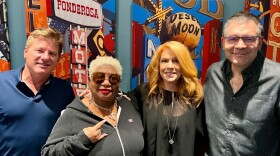When cowboys come to mind, they may be real-life people turned legends -- Billy the Kid, or Wyatt Earp, or Annie Oakley, let’s say. Or they may be fictional -- Hopalong Cassidy, or the Marlboro Man, or one of many roles featuring John Wayne.
All of these cowboys are white. And that overlooks history: there were also black cowboys, and they played an important role in the American West.
Musician Dom Flemons has been thinking a lot about those cowboys, and his forthcoming album features their songs. Flemons joins us from the studios of WBEZ Radio in Chicago.
On Sunday, January 29, 2017 at 2 p.m., he’ll be at the Winchester Cultural Center in Clark County, NV. And next week he performs at the annual National Cowboy Poetry Gathering in Elko.
Flemons is also the host of the American Songster Radio Podcast, which is a production of North Carolina Public Radio/WUNC.
Edited Interview Highlights
What got you thinking about the black cowboy?
It wasn’t until I was 23 or 24 – this was 2006 or 2007 – I came across a book called, “The Negro Cowboys” [by Philip Durham and Everett L. Jones; University of Nebraska Press], which really explained a lot of the history of the settlement of the West, and also the African-American participation of that settlement. If you think of slavery as an economic issue, and you emancipated all the slaves, then all of a sudden there was a void for the economy. So, you had all these big plantations, and you had people who owned cattle. And by the time the Civil War had ended, there was a lot of cattle that was freely roaming in the South. Then there was the migration of business entrepreneurs toward the West – they took it farther into places like Wyoming and into Oregon and Montana and Kansas – you had these entrepreneurs hiring independent contractors to round up all the cattle in the South, and then they had to establish trails, on which they moved the cattle out West to these gigantic farms, which sometimes looked like big plantations. Other times there were different entrepreneurs who had different set-ups for their farms. But it was the same idea. So, the cattle became its own economy. And that ran right into the development of the railroad. So, it was first the trails without the railroads, and then later it became the railroad traffic. And that’s where the African-American cowboy becomes very interesting because it goes from these African-Americans being freed from slavery working as entrepreneurs breaking cattle and whatnot – there were a lot of ways people worked – but then many of these cowboys became Pullman porters, which is an essential part of the history.
Were African-Americans accepted on the trail? Did black and white cowboys directly work together and socialize? Was there segregation?
There wasn’t segregation in the straight-forward sense like what was going on in the East coast and the major cities. But the people were okay with suppressing the idea of the black cowboy and also the African-American person. But also – having grown up [in the West] myself, the African-American community isn’t as big say in the Deep South. The opportunities for black people were just different. And the way you had to make your way into society, find acceptance in that society, and also figuring out ways to find work for yourself – it was a little bit different. There are a lot of great quotes from the early black cowboys. There’s one fellow named Mathew “Bones” Hooks, who was a cowboy of the Panhandle. He mentioned that anyone who was on the trail that wanted to abuse him, he already knew that man wasn’t going to last on the trail too long because he wasn’t a tough enough person to do the type of work that was necessary. Also with Bones Hooks, he was unique in a certain way because all of the pioneers shared a common bond of being the people who pioneered their part of the United States. And so people socially might say that they were not equal, but when it came to being able to have actual relationships with the people who settled the country with them – someone like Bones Hooks could walk into the front door of a place because they knew it was old Bones who had settled the place WITH them, instead of it being unnamed African-American person who is just walking in there. The settlers that came in later brought their racism and discriminatory practices with them. But the settlers – there was sort of an even playing field because everybody was working and trying to make it.
What can you tell us about Charley Willis? He wrote the song “Good-bye Old Paint.”
His story is one of the enduring legends of what makes the idea of black cowboy so interesting. Charley Willis – he was an ex-slave, but when he was emancipated he went out to the ranches and basically – some cowboys would work for a salary. Other cowboys would work for individual payment for each horse that they broke for a rancher. A lot of the African-American cowboys tended to work as freelancers. So, they would jump back and forth. Charley Willis worked on the trail from the Texas Panhandle to Abilene, Kansas. Charley Willis was also known as a great singer as well. He was known for his singing voice being soothing. And it could sooth the cows. A lot of the African-American cowboys had these nice singing voices that they could use to calm the cows. If you’re moving several thousand head of cattle, and they all get scared, and start stampeding, that’s one of the biggest pitfalls of being a cowboy, especially in those early days. Charley Willis had that going for him.
Dom Flemons, North Carolina-based musician









